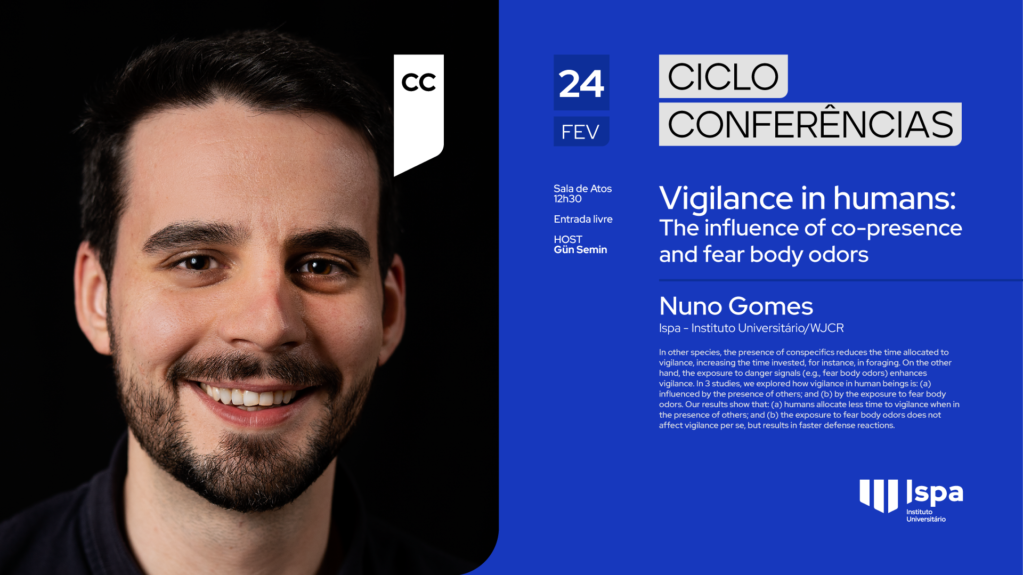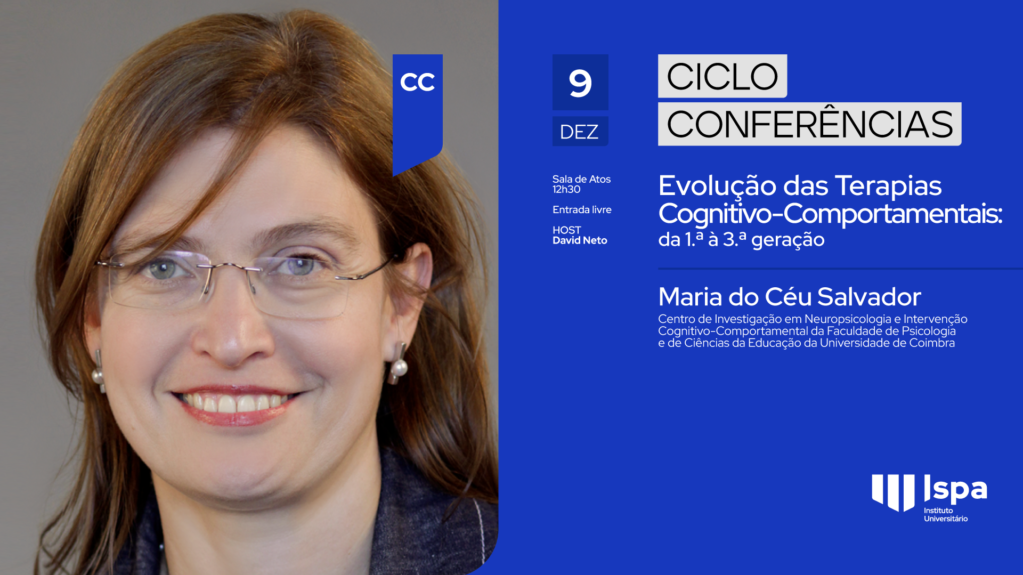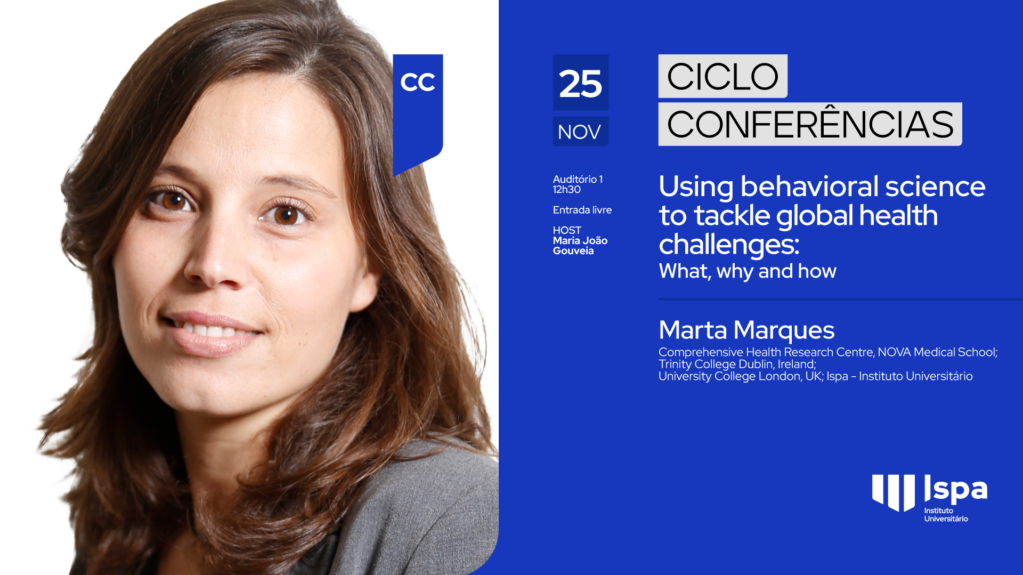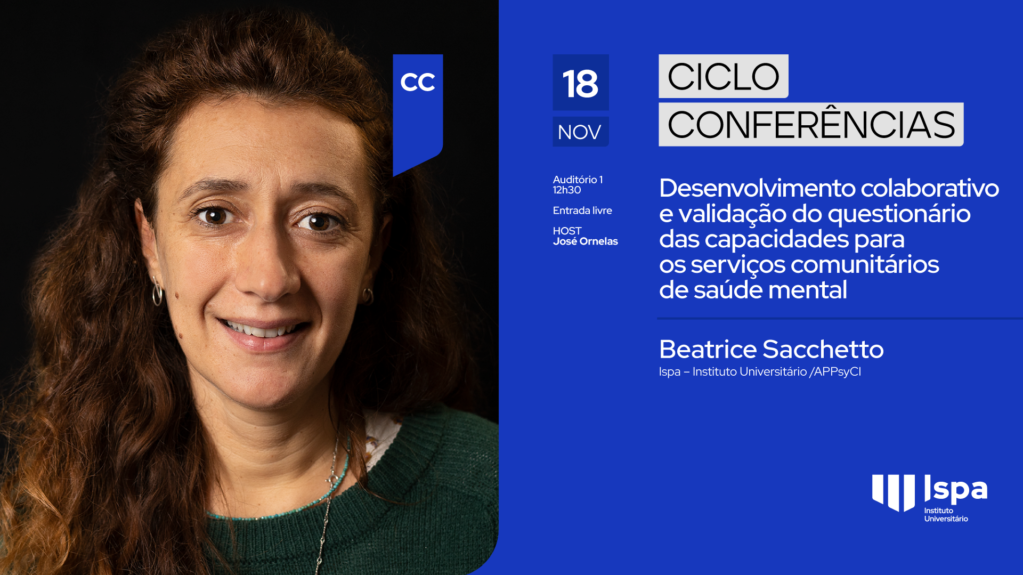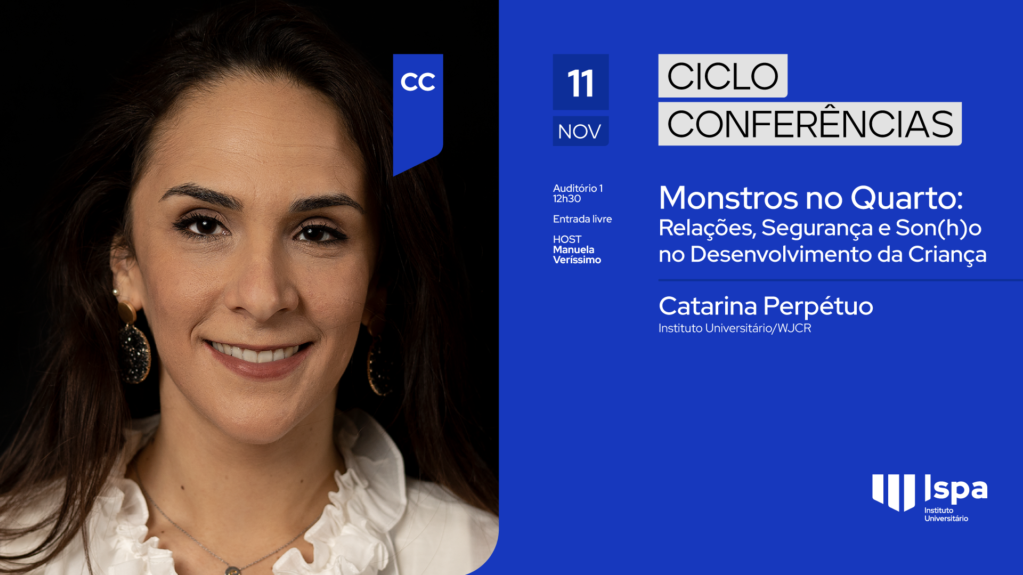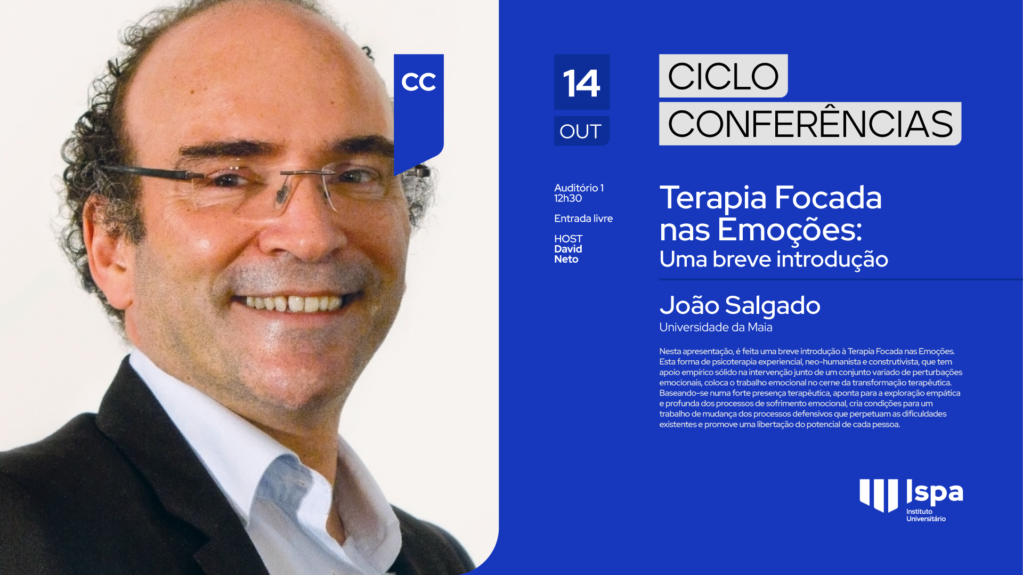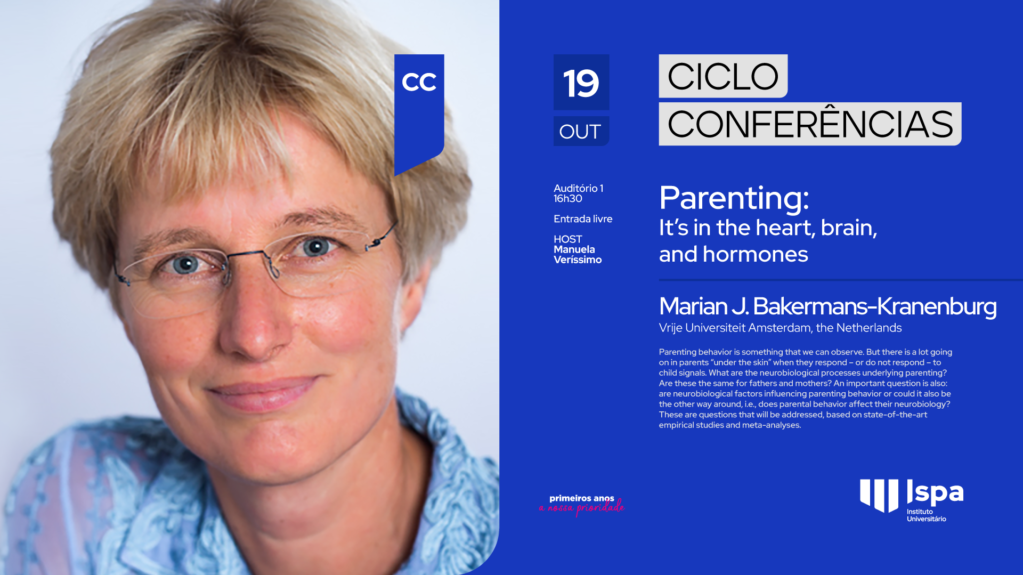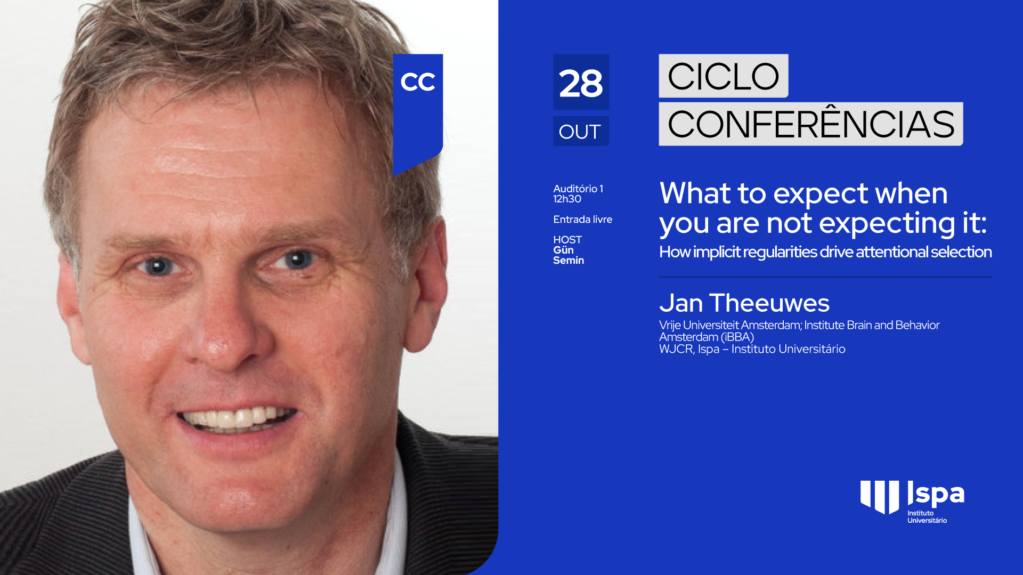Ciclo de Conferências
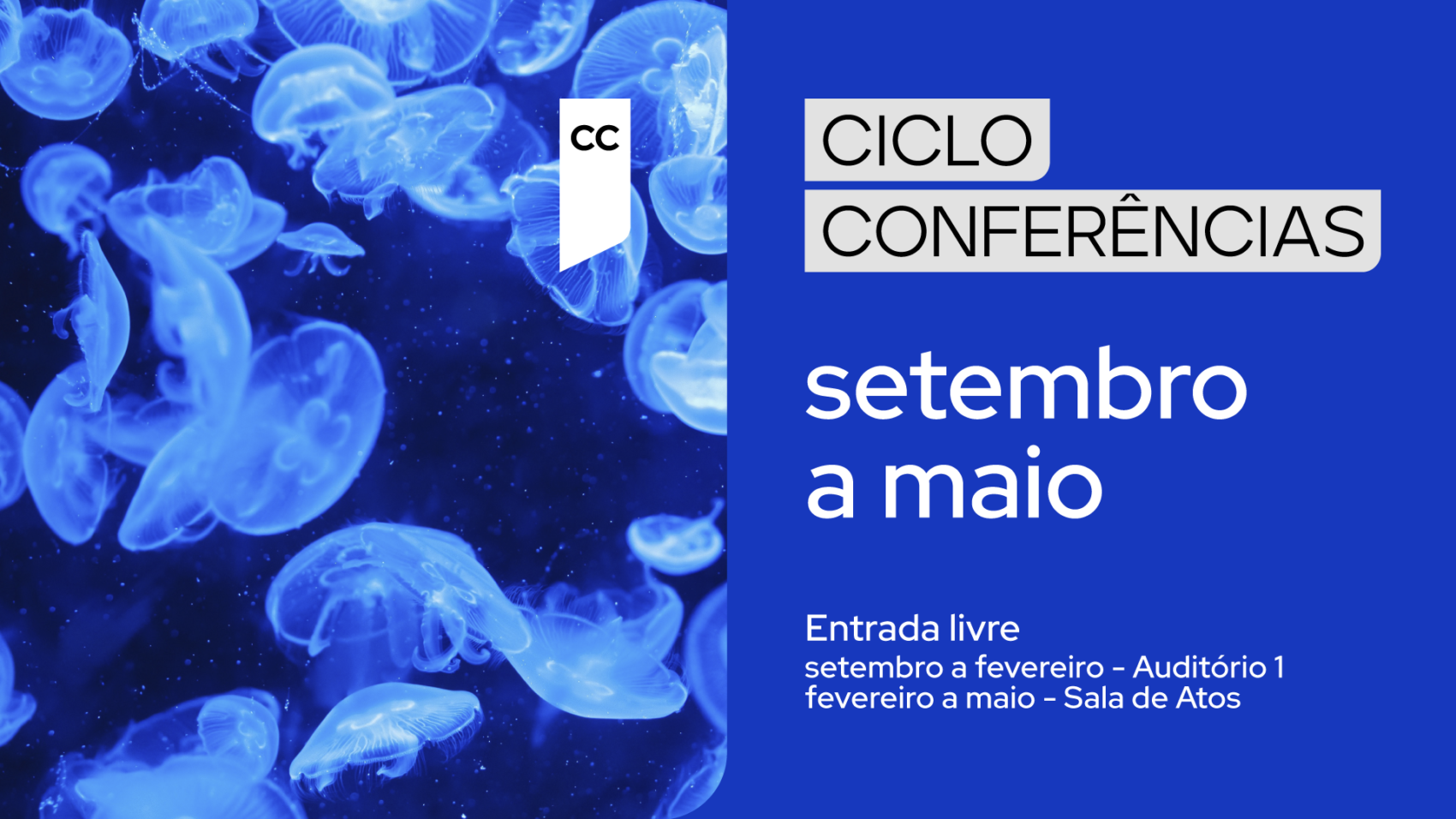
O que de mais recente acontece na ciência, com Ispianos e convidados, de Portugal e de todo o mundo.
Fevereiro
Regulação Emocional e Relações Interpessoais: Implicações para o Funcionamento Psicológico
(Ispa – Instituto Universitário)
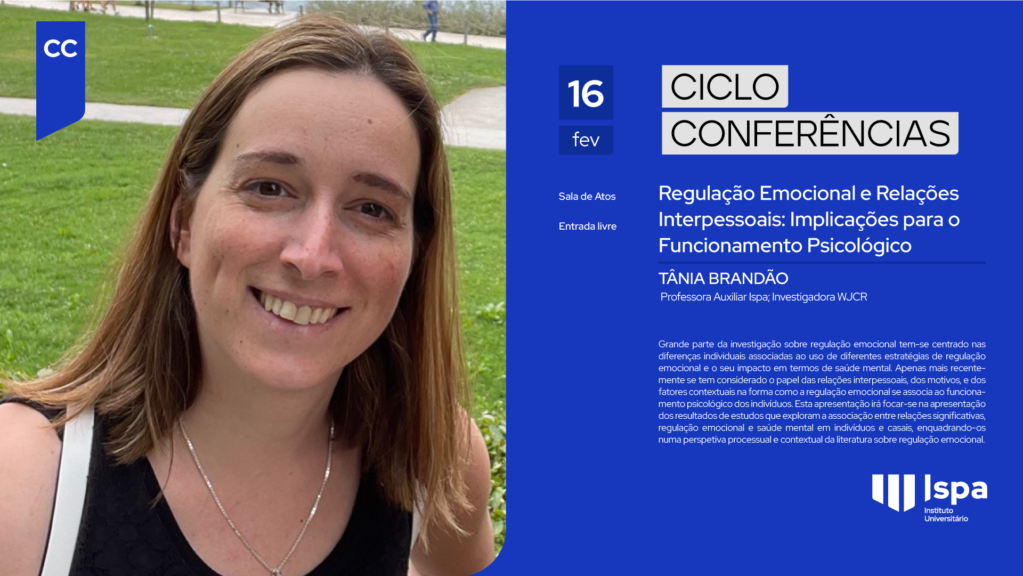
Entrada livre.
Abstract:
Grande parte da investigação sobre regulação emocional tem-se centrado nas diferenças individuais associadas ao uso de diferentes estratégias de regulação emocional e o seu impacto em termos de saúde mental. Apenas mais recentemente se tem considerado o papel das relações interpessoais, dos motivos, e dos fatores contextuais na forma como a regulação emocional se associa ao funcionamento psicológico dos indivíduos. Esta apresentação irá focar-se na apresentação dos resultados de estudos que exploram a associação entre relações significativas, regulação emocional e saúde mental em indivíduos e casais, enquadrando-os numa perspetiva processual e contextual da literatura sobre regulação emocional.
Janeiro
Early Childhood Education in Finland- From Policy to Practice
(University of Jyväskylä (JYU; Finland) / Nord University (NO; Norway)
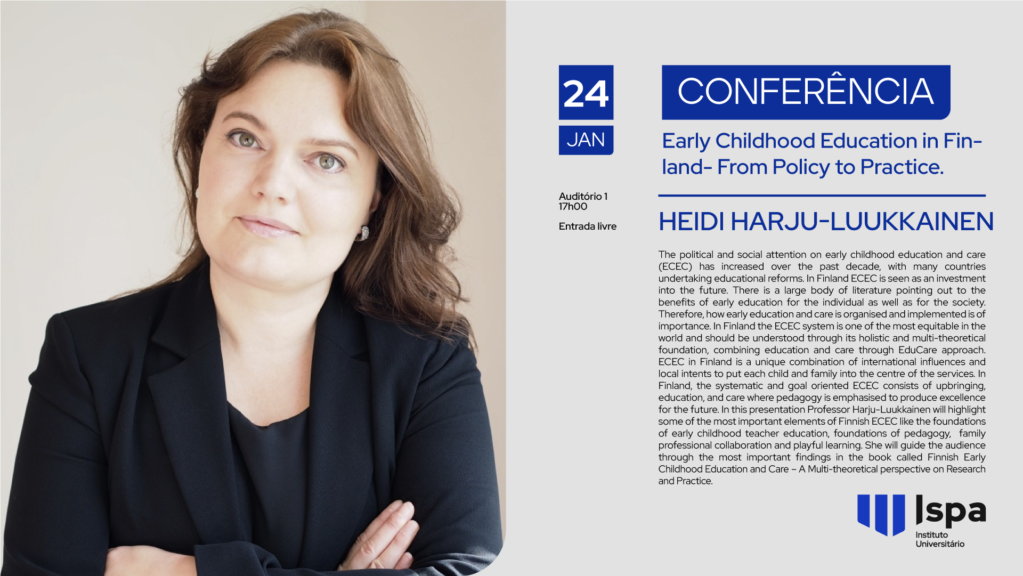
Entrada mediante inscrição prévia.
Abstract:
The political and social attention on early childhood education and care (ECEC) has increased over the past decade, with many countries undertaking educational reforms. In Finland ECEC is seen as an investment into the future. There is a large body of literature pointing out to the benefits of early education for the individual as well as for the society. Therefore, how early education and care is organised and implemented is of importance. In Finland the ECEC system is one of the most equitable in the world and should be understood through its holistic and multi-theoretical foundation, combining education and care through EduCare approach. ECEC in Finland is a unique combination of international influences and local intents to put each child and family into the centre of the services. In Finland, the systematic and goal oriented ECEC consists of upbringing, education, and care where pedagogy is emphasised to produce excellence for the future. In this presentation Professor Harju-Luukkainen will highlight some of the most important elements of Finnish ECEC like the foundations of early childhood teacher education, foundations of pedagogy, family professional collaboration and playful learning. She will guide the audience through the most important findings in the book called Finnish Early Childhood Education and Care – A Multi-theoretical perspective on Research and Practice.
Bio:
Heidi Harju-Luukkainen works as a full Professor of education at the University of Jyväskylä (JYU; Finland) and at the Nord University (NO; Norway). At the University of Jyväskylä she works as a Vice Director of the Kokkola University Consortium Chydenius campus and is also the director of the educational sciences including class teacher education, special teacher education and early childhood teacher education. She is a member of the Jyväskylä University educational council. Further, She leads a research group as well as the doctoral program in education, where she supervises and teaches. Harju-Luukkainen is also the founder of Chydenius Learning Lab, an interdisciplinary infrastructure supporting research and UNESCO/Unitwin management team member. In Norway (NO) Professor Harju-Luukkainen leads an international research group and teaches on PhD level. Further, she holds a PhD in Education, a Qualification in Leadership and Management and a Special Education Teacher and Subject TeacherQualifications from Finland. She has been working broadly in the world, in five different countries, in top ranked universities like the University of California, Los Angeles (UCLA), University of Southern California (USC), University of Gothenburg (GU) and University of Helsinki (HU).
Her research interests are broad and interdisciplinary but have mainly been focusing on questions related to education. She has worked in more than 40 different research and developmental projects in Europe and in the USA. At the moment she have several ongoing research projects. In 2021 she was funded with a research group by Norwegian council of Norway for a Norwegian National Centre for Research on Special Needs Education and Inclusive Practice. Also further she is doing innovative research in the Sámi indigenous ECEC context in Norway, funded by the Research council of Norway. Through the Universities of the Arctic network she is involved in multiple other international projects like Distance Teaching and Learning in the Arctic Communities (DistARCTIC) and Transformative Teacher Education for the Sustainable North (TTE). Further, she was recently funded by the Swedish Research Council for a project called Inequalities to access in Swedish preschools. Her other ongoing projects are connected to global, inclusive or minority questions. She is also a leader of two international research groups called Teaching and learning in a time of change and Social justice and diversity in education.
During her career she has published extensively both in peer reviewed journals, international books, as well as scientific reports. Altogether she has published more than 260 scholarly works. She has edited multiple international books like ”Nordic Families, Children and Early Childhood Education” for Palgrave Macmillan, ”Finnish Early Childhood Education and Care – Multi-theoretical perspective on policy and practice” for Springer Nature, ”Special Education in the Early Years. Perspectives on Policy and Practice in the Nordic” Countries for Springer Nature and ”Parental Engagement and Early Childhood Education around the World” for Taylor & Francis. Further she works as an Editor-in-Chief for Journal of Early Childhood Education Research (JECER), Subject editor for Journal of Nordic Research in Early Childhood Educational Research and Editorial Board member for Educational Assessment. She has also actively been developing university programs. In Finland she has developed a graduate program in ECEC for the University of Helsinki and Unviersity of Jyväskylä. She has been developing PhD program contents for multiple universities and have had doctoral students across Europe, USA, Africa and Asia. She has had the honor to work at the Ministry of Education in Finland, assessing education nationally, developing the future guidelines for primary education,and working as a principal investigator in the Finnish PISA-team during PISA 2009, 2012 and 2015. She has also worked outside the university context as a President for the Finnish Parent’s Association (NGO) during 2014-2016. At the moment she is also a member of the ethical research committee at NGO Folkhälsan responsible for the ethical guidelines of medical and social science research projects.
HISTÓRICO
Dezembro
O que podemos melhorar na preparação dos futuros professores para o ensino da leitura e da escrita?
(Professora Auxiliar do Departamento de Psicologia da Universidade de Évora)
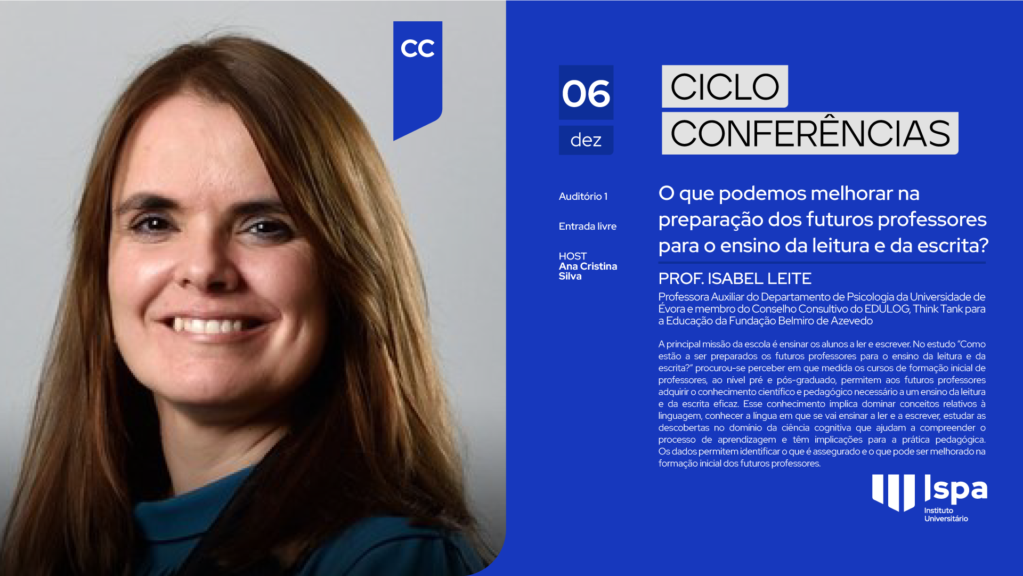
Abstract: A principal missão da escola é ensinar os alunos a ler e escrever. No estudo “Como estão a ser preparados os futuros professores para o ensino da leitura e da escrita?” procurou-se perceber em que medida os cursos de formação inicial de professores, ao nível pré e pós-graduado, permitem aos futuros professores adquirir o conhecimento científico e pedagógico necessário a um ensino da leitura e da escrita eficaz. Esse conhecimento implica dominar conceitos relativos à linguagem, conhecer a língua em que se vai ensinar a ler e a escrever, estudar as descobertas no domínio da ciência cognitiva que ajudam a compreender o processo de aprendizagem e têm implicações para a prática pedagógica. Os dados permitem identificar o que é assegurado e o que pode ser melhorado na formação inicial dos futuros professores.
Host: Ana Cristina Silva
Novembro
Moved to tears?
PHD
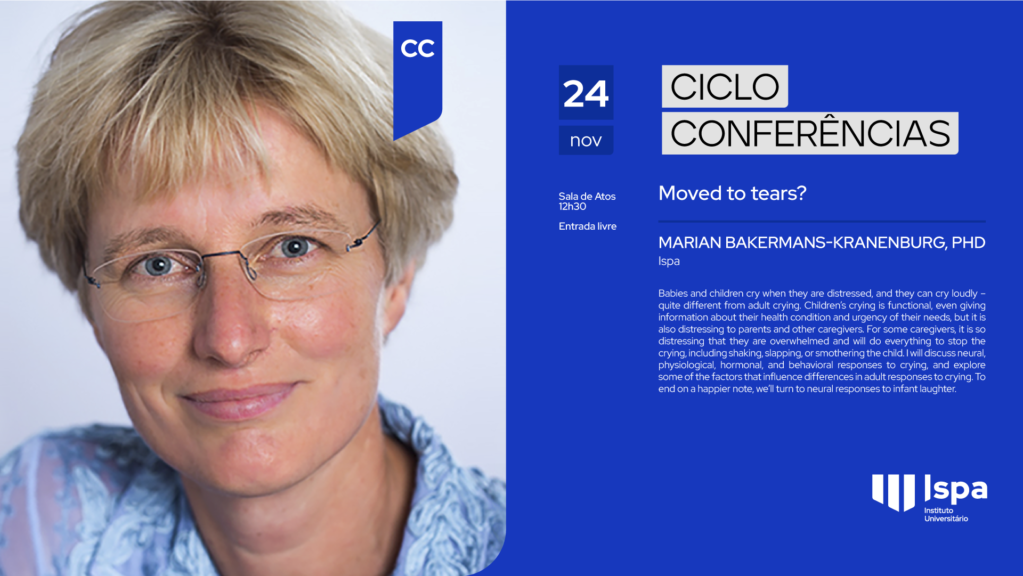
Abstract: Babies and children cry when they are distressed, and they can cry loudly – quite different from adult crying. Children’s crying is functional, even giving information about their health condition and urgency of their needs, but it is also distressing to parents and other caregivers. For some caregivers, it is so distressing that they are overwhelmed and will do everything to stop the crying, including shaking, slapping, or smothering the child. I will discuss neural, physiological, hormonal, and behavioral responses to crying, and explore some of the factors that influence differences in adult responses to crying. To end on a happier note, we’ll turn to neural responses to infant laughter.
Arts-Based Programs for Community Rehabilitation of People with Mental Health Conditions
(School of Creative Arts Therapies, University of Haifa, Israel / MA in drama therapy, New York University, NY, USA)
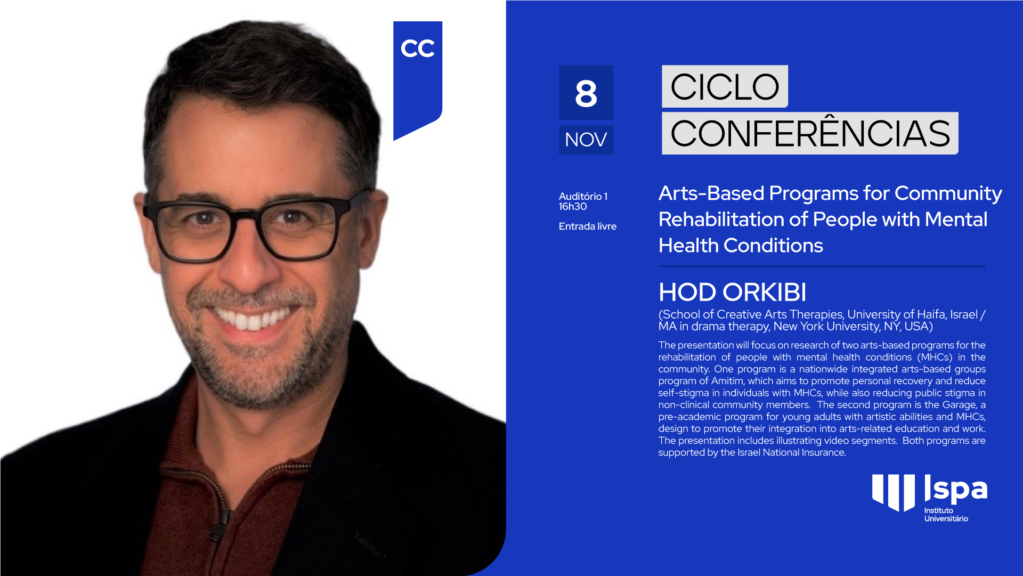
Abstract: The presentation will focus on research of two arts-based programs for the rehabilitation of people with mental health conditions (MHCs) in the community. One program is a nationwide integrated arts-based groups program of Amitim, which aims to promote personal recovery and reduce self-stigma in individuals with MHCs, while also reducing public stigma in non-clinical community members. The second program is the Garage, a pre-academic program for young adults with artistic abilities and MHCs, design to promote their integration into arts-related education and work. The presentation includes illustrating video segments. Both programs are supported by the Israel National Insurance.
Host: António Gonzalez (APPsyCI – Applied Psychology Research Center Capabilities and Inclusion)
Outubro
What works with women in conflict with the law?
(University of Cambridge)
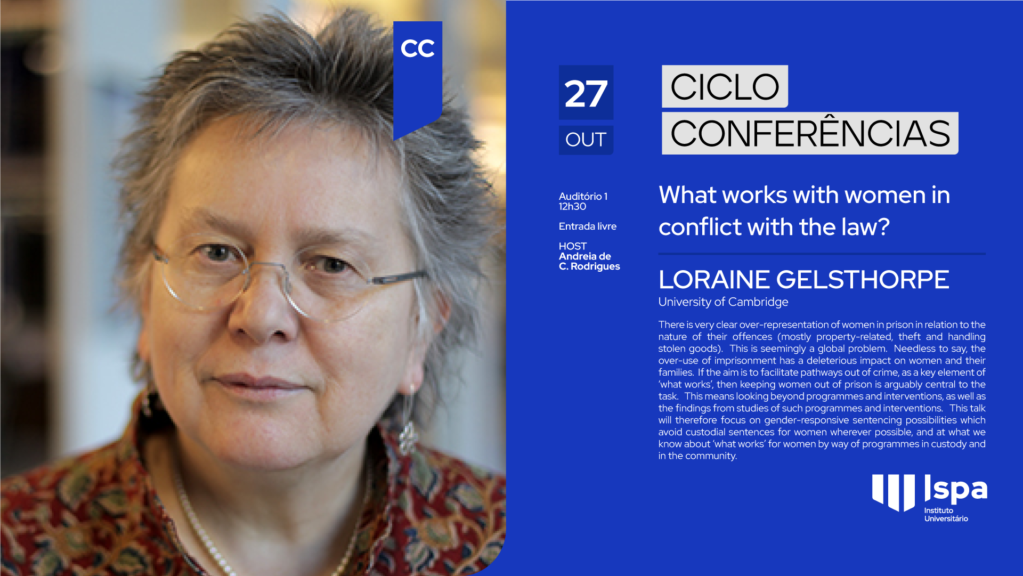
Abstract: There is very clear over-representation of women in prison in relation to the nature of their offences (mostly property-related, theft and handling stolen goods). This is seemingly a global problem. Needless to say, the over-use of imprisonment has a deleterious impact on women and their families. If the aim is to facilitate pathways out of crime, as a key element of ‘what works’, then keeping women out of prison is arguably central to the task. This means looking beyond programmes and interventions, as well as the findings from studies of such programmes and interventions. This talk will therefore focus on gender-responsive sentencing possibilities which avoid custodial sentences for women wherever possible, and at what we know about ‘what works’ for women by way of programmes in custody and in the community.
Host: Andreia de Castro Rodrigues
O papel do psicólogo clínico em cuidados paliativos: desafios e princípios de intervenção
(Ispa)
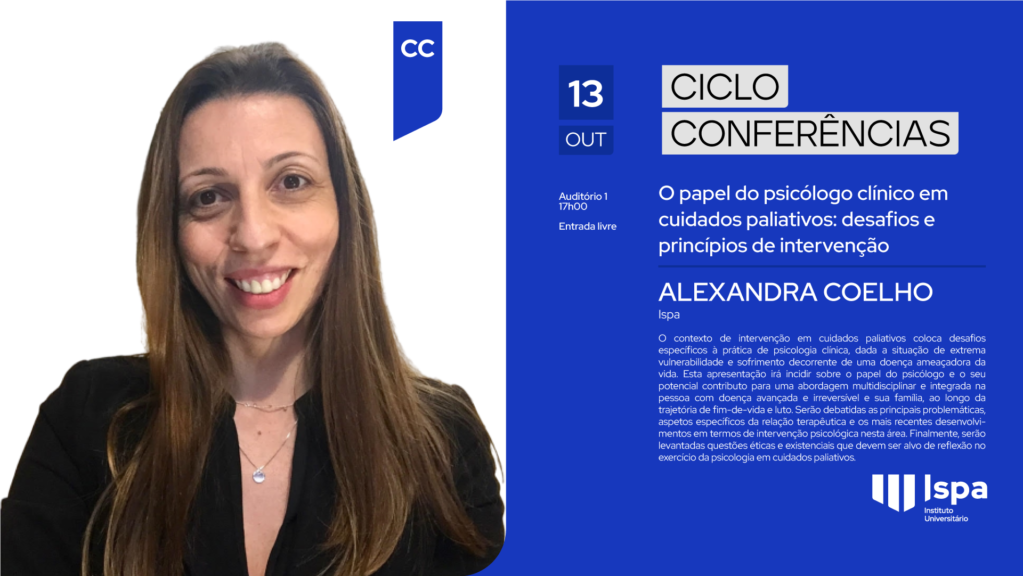
Abstract: O contexto de intervenção em cuidados paliativos coloca desafios específicos à prática de psicologia clínica, dada a situação de extrema vulnerabilidade e sofrimento decorrente de uma doença ameaçadora da vida. Esta apresentação irá incidir sobre o papel do psicólogo e o seu potencial contributo para uma abordagem multidisciplinar e integrada na pessoa com doença avançada e irreversível e sua família, ao longo da trajetória de fim-de-vida e luto. Serão debatidas as principais problemáticas, aspetos específicos da relação terapêutica e os mais recentes desenvolvimentos em termos de intervenção psicológica nesta área. Finalmente, serão levantadas questões éticas e existenciais que devem ser alvo de reflexão no exercício da psicologia em cuidados paliativos.
Setembro
Becoming Kind: Nurturing Every Child’s Social-Emotional Potential
(University of Toronto)
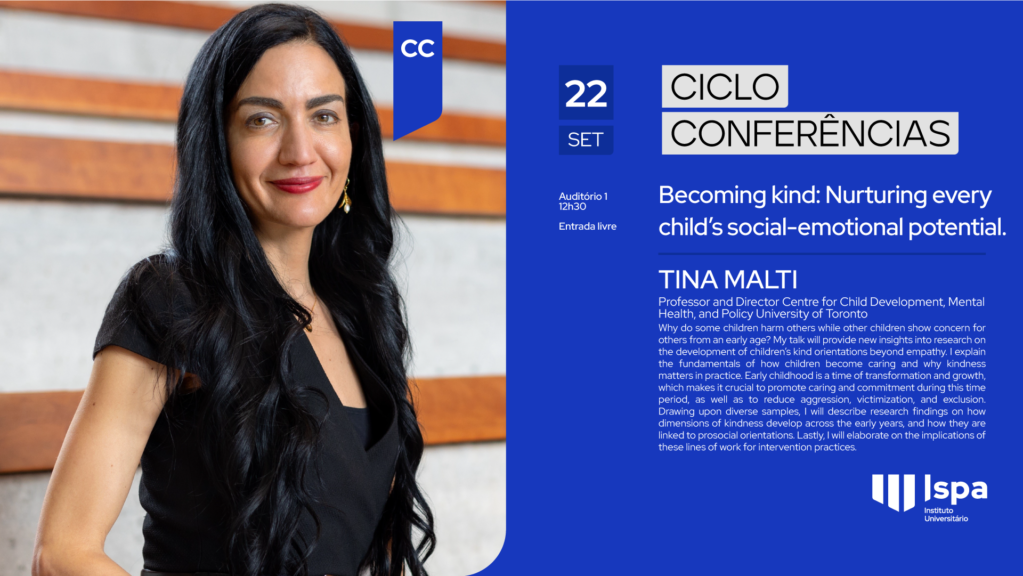
Abstract: Why do some children harm others while other children show concern for others from an early age? My talk will provide new insights into research on the development of children’s kind orientations beyond empathy. I explain the fundamentals of how children become caring and why kindness matters in practice. Early childhood is a time of transformation and growth, which makes it crucial to promote caring and commitment during this time period, as well as to reduce aggression, victimization, and exclusion. Drawing upon diverse samples, I will describe research findings on how dimensions of kindness develop across the early years, and how they are linked to prosocial orientations. Lastly, I will elaborate on the implications of these lines of work for intervention practices.
Maio
Innovative parenting solutions that engage marginalised and excluded families: building evidence and taking to scale
(King’s College, University of London)
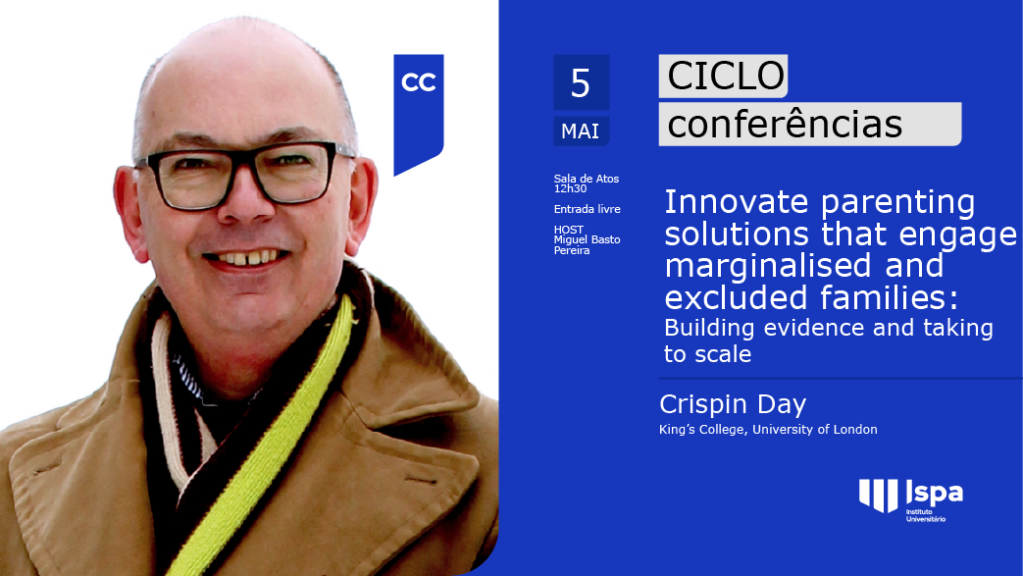
Abstract: The prevalence of child mental health disorders has reached critical levels. Parenting is the most important influence on developmental outcomes. Group format parenting programmes are the recommended evidence-based method of intervention for child behavioural and conduct problems. Family stigma, practical problems, lack of intervention availability and complex referral routes mean that that the majority of families whose children are at highest risk fail to receive adequate support.
Empowering Parents Empowering Communities (EPEC) is an innovative parent-led parenting programme designed to improve access and outcomes for socially disadvantaged, marginalised and minoritised families. Developed in the UK, this paper will describe the rationale, content and methods of EPEC’s approach. It will describe the research evidence supporting the programme, the latest findings from taking EPEC to scale across the UK and internationally as well as emerging evidence of online and digital delivery.
Host: Miguel Basto-Pereira
Abril
Aprender na escola e andar na escola: reflexões sobre a essência e o dispêndio
(Pedagogo, Consultor para a Formação e Designer Social)
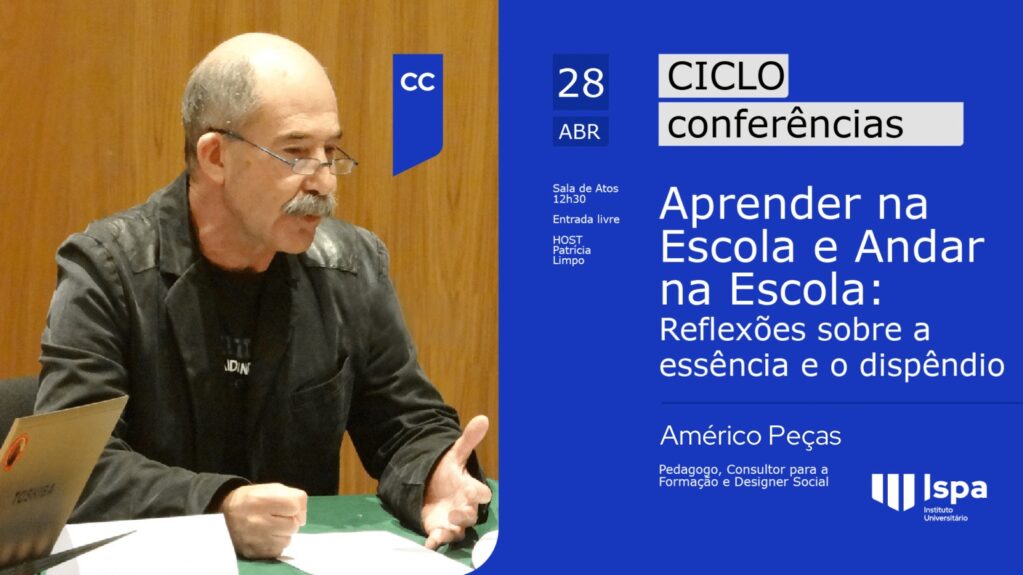
Abstract: Apesar do acesso à escola, como direito, ainda estar longe de ser universal, e até para sublinhar a defesa intransigente da escola para todos como experiência vital de cidadania e de cultura, precisamos a todo o momento de questionar a relevância dos percursos escolares. O que é essência e o que é dispêndio no tempo alargado de escolarização que caracteriza as nossas sociedades? E de que inquietações tem de se fazer a pedagogia, sabendo-se que não é ciência exata, antes se revelando e fecundando na medida em que souber interpretar o real? As respostas certas, a haver, estarão no substrato da ética, da ciência e da política – na arte do encontro humano implicado com o bem do mundo.
Host: Patrícia Limpo
Trabalho de equipa em contexto virtual: das fronteiras físicas às fronteiras psicológicas
(ISCTE-IUL)
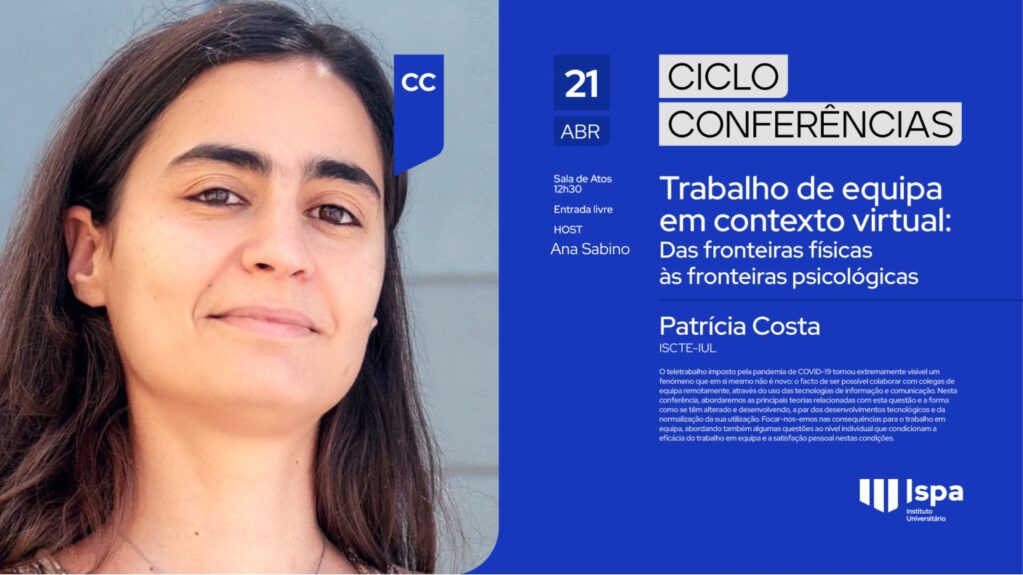
Abstract: O teletrabalho imposto pela pandemia de COVID-19 tornou extremamente visível um fenómeno que em si mesmo não é novo: o facto de ser possível colaborar com colegas de equipa remotamente, através do uso das tecnologias de informação e comunicação. Nesta conferência, abordaremos as principais teorias relacionadas com esta questão e a forma como se têm alterado e desenvolvendo, a par dos desenvolvimentos tecnológicos e da normalização da sua utilização. Focar-nos-emos nas consequências para o trabalho em equipa, abordando também algumas questões ao nível individual que condicionam a eficácia do trabalho em equipa e a satisfação pessoal nestas condições.
Host: Ana Sabino
Avaliação formativa: da teoria à prática pedagógica
(Ispa – Instituto Universitário)
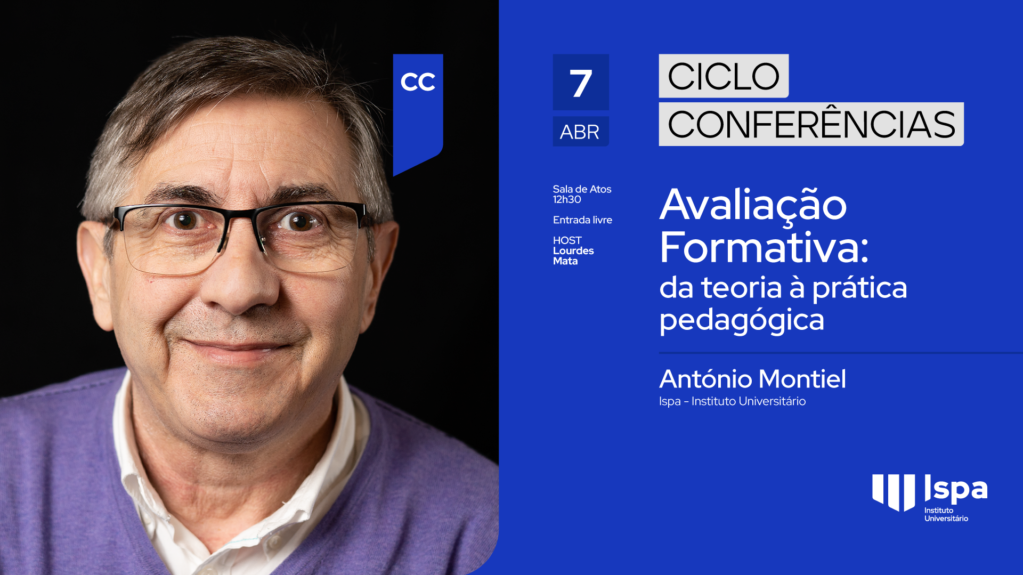
Abstract: A transformação em curso do sistema educativo e de formação em Portugal visa melhorar as práticas pedagógicas das escolas e dos seus professores, nomeadamente no domínio da avaliação formativa, como principal modalidade de avaliação. O propósito final deste trabalho é observar o impacto da participação dos professores numas Oficinas de Formação sobre os “Contributos da avaliação formativa para uma educação personalizada e inclusiva”. Serão capazes estas Oficinas, seguindo os princípios metodológicos da investigação colaborativa sobre a prática, de alterar a perceção (teórica) e a prática da avaliação formativa desses professores?
Host: Lourdes Mata
Março
Responsividade, envolvimento e diretividade em creche: atividades ou interações?
(Faculdade de Psicologia e de Ciências da Educação da Universidade do Porto)
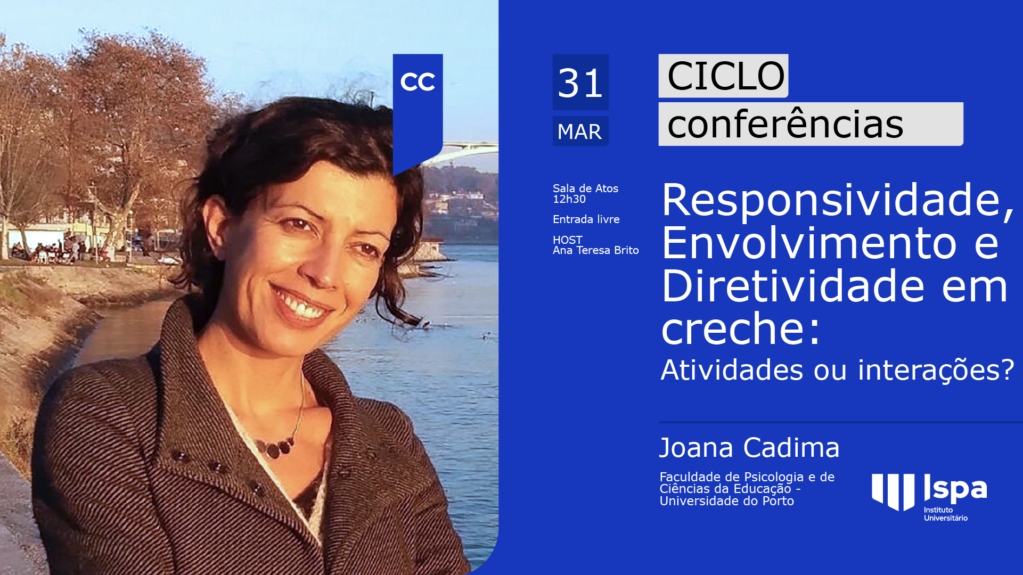
Abstract: Nesta apresentação, iremos apresentar alguns resultados de dois projetos de investigação realizados em creche no contexto português. O primeiro estudo, QualityMatters, envolveu 120 salas de creche em 4 países (Portugal, Finlândia, Polónia e Holanda). O segundo estudo, Bebés Em Creche, envolveu 90 berçários portugueses. Ambos os estudos permitiram analisar as interações entre os educadores de infância e os bebés/crianças e examinar as complexas relações entre as atividades, as rotinas e o grau de envolvimento dos adultos. Durante a apresentação, serão discutidas as condições facilitadoras de interações afetuosas, responsivas e estimulantes, bem como os principais desafios. Serão ainda partilhadas algumas reflexões à luz do conhecimento científico atual.
Host: Ana Teresa Brito
Acceptance and commitment therapy digital interventions: new opportunities and developments
(University of Cyprus)
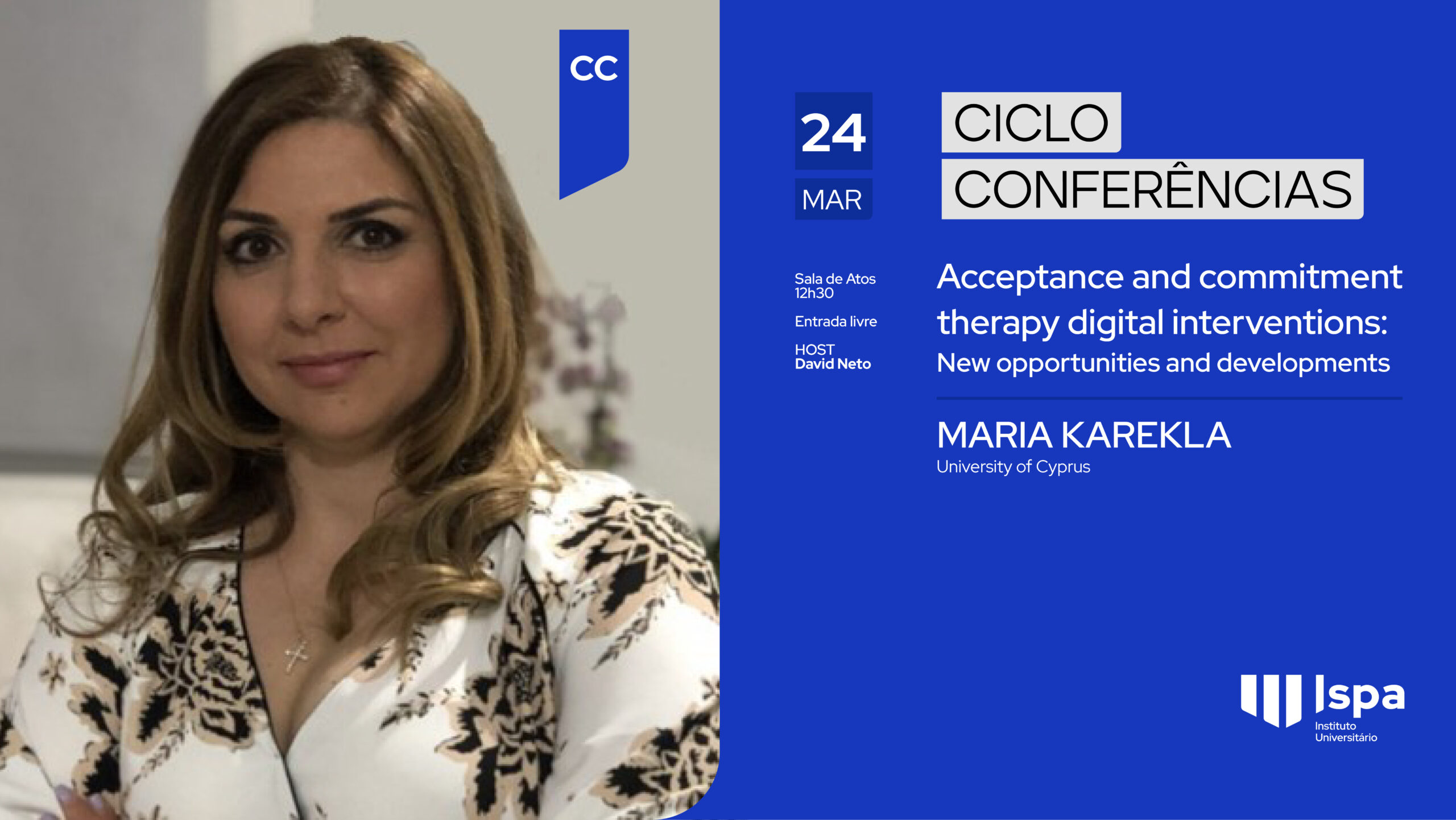
Abstract: Approximately half of the world’s population owns a smart phone and uses the internet. Digitized means present with great opportunities to harness health behavior change in individuals. The digitalization of societies, coupled with increasing demands for self-management, cost-effectiveness, time-limited, widely accessible and quality services, present with an ideal arena for innovative approaches in the provision of services. Acceptance and Commitment Therapy (ACT) informed digitized interventions are gaining ground in their ability to effectively achieve health behavior change and lead to improvements in vitality and well being among individuals who suffer from a variety of health and mental health problems. This presentation examines the opportunities and challenges for utilizing digitized ACT interventions. Findings and lessons learned from ACThealthy laboratory’s recent studies will be presented, using a variety of digitized innovations in the prevention and treatment of human suffering.
Host: David Neto
Reserva cognitiva: um escudo para o cérebro?
(Ispa – Instituto Universitário/Fundação Champalimaud)
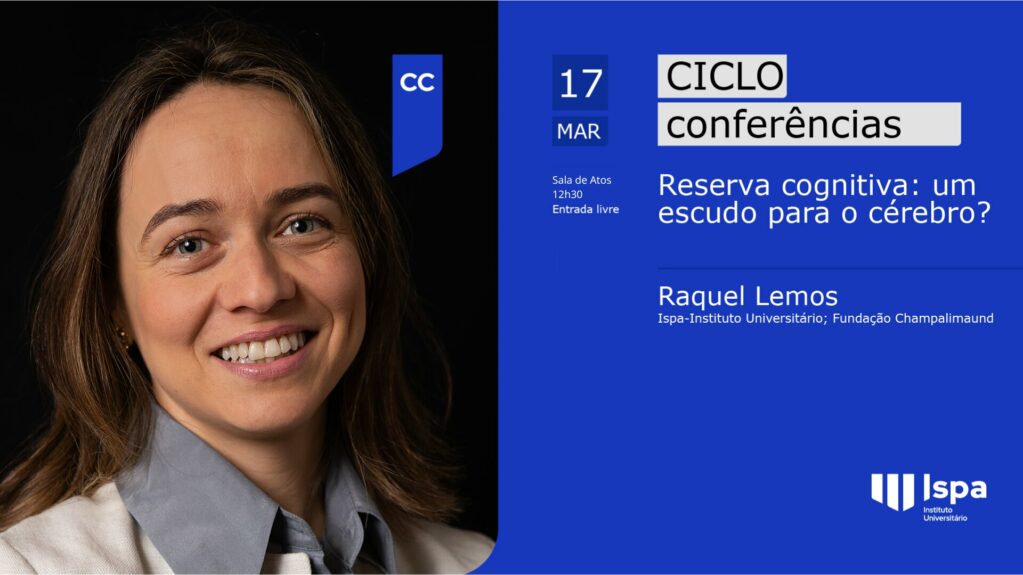
Abstract: A reserva cognitiva (RC) corresponde à capacidade do cérebro em manter um determinado nível de desempenho na presença de uma agressão, tal como uma doença neurodegenerativa ou um evento traumático. A RC é habitualmente estimada através de medidas indiretas, tais como o nível de escolaridade. No entanto, a validação empírica de medidas diretas, passíveis de manipulação, tem se revelado cada vez mais desafiante.
Nesta apresentação, iremos revisitar este construto tão importante para as neurociências cognitivas e acompanhar a evolução das suas formas de avaliação.
Host: a confirmar
Cavalos-marinhos em Portugal: passado, presente e futuro
(MARE, Ispa – Instituto Universitário/IUCN [SPS SG])
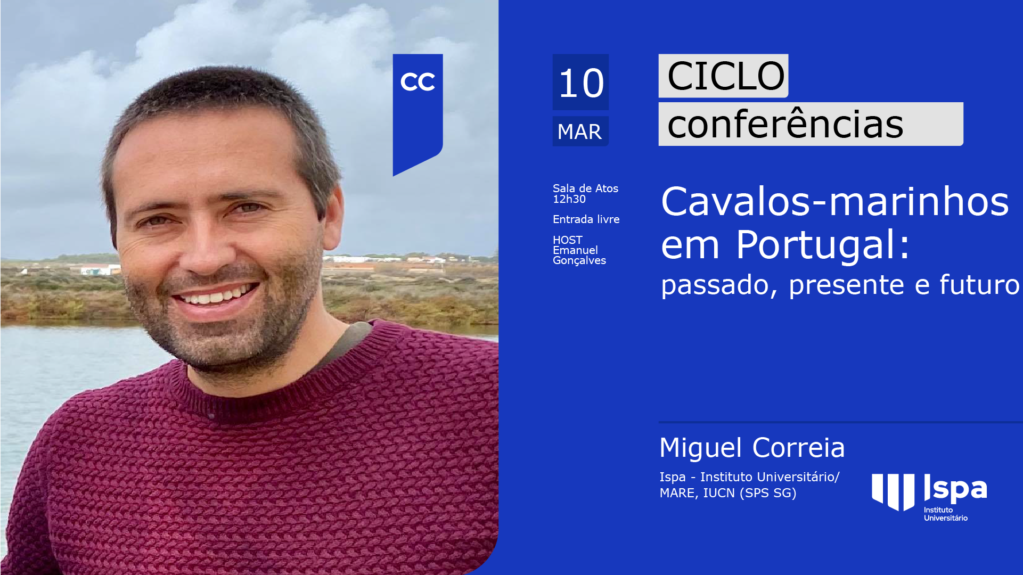
Abstract: No início do século foi encontrada a maior comunidade de cavalos-marinhos situada nas águas da Ria Formosa. Este cenário favorável veio a ser transformado por um decréscimo acentuado nos efetivos populacionais das duas espécies que habitam as zonas costeiras Portuguesas (Hippocampus guttulatus e Hippocampus hippocampus). Surgiu então a necessidade de determinar as ameaças que sustentaram este declínio bem como o estudo e a implementação de ações de mitigação de modo a restaurar uma população que outrora se assumiu como uma referência mundial.
Host: Emanuel Gonçalves
Vigilance in humans: the influence of co-presence and fear body odors
(WJCR, Ispa – Instituto Universitário)
Abstract: In other species, the presence of conspecifics reduces the time allocated to vigilance, increasing the time invested, for instance, in foraging. On the other hand, the exposure to danger signals (e.g., fear body odors) enhances vigilance. In 3 studies, we explored how vigilance in human beings is: (a) influenced by the presence of others; and (b) by the exposure to fear body odors. Our results show that: (a) humans allocate less time to vigilance when in the presence of others; and (b) the exposure to fear body odors does not affect vigilance per se, but results in faster defense reactions.
Host: Gün Semin
Intervenções móveis e digitais para a promoção de comportamentos de saúde: Onde estamos e para onde vamos?
(CIPER/FMH – Universidade de Lisboa)
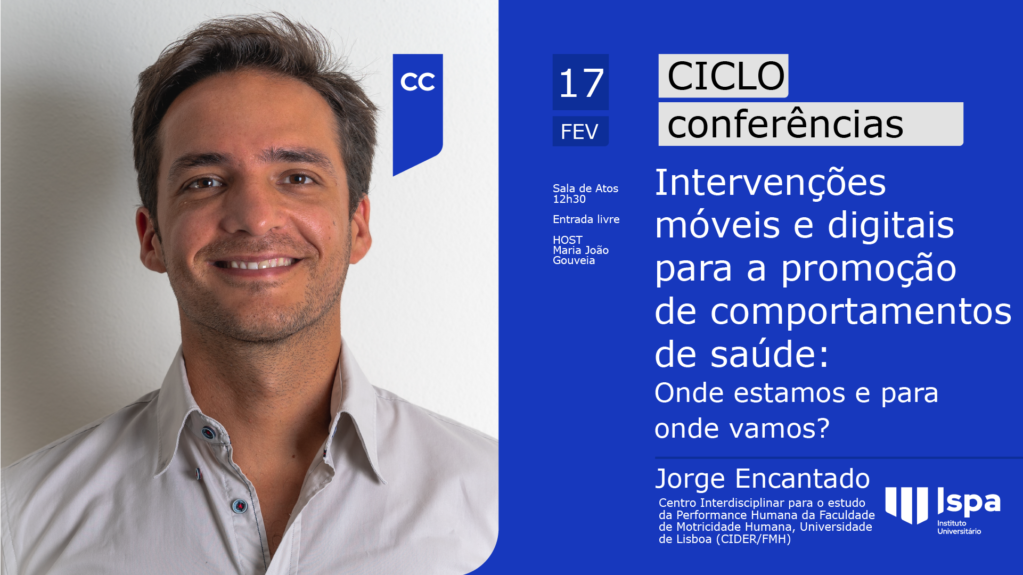
Abstract: As tecnologias digitais constituem hoje uma alternativa de intervenção para a promoção dos comportamentos de saúde com elevada escalabilidade e relação custo-benefício. Desde as aplicações móveis, às mensagens de texto, aos jogos de movimento, ou até à realidade virtual, os desenvolvimentos nos últimos anos têm sido muito significativos e promissores. Neste contexto, a comunicação focar-se-á na literatura relativa à gestão de peso e à promoção da atividade física. Complementarmente, será também dada uma visão mais geral da literatura mais recente sobre as intervenções digitais para promoção dos comportamentos de saúde: as mais recentes revisões, os principais projetos atualmente em curso, e as perspetivas de desenvolvimento futuro nesta área, em que a Psicologia tem e terá um papel fundamental.
Host: Maria João Gouveia
Evolução das Terapias Cognitivo-Comportamentais: da 1.ª à 3.ª geração
(Centro de Investigação em Neuropsicologia e Intervenção Cognitivo-Comportamental da Faculdade de Psicologia e de Ciências da Educação da Universidade de Coimbra)
Abstract: As “terapias cognitivo-comportamentais (TCC) incluem diversas intervenções com o mais extenso suporte empírico, deste a terapia comportamental (1ª geração), passando pela terapia cognitivo-comportamental (2º geração), até chegar às terapias contextuais (3ª geração). Se as duas primeiras visam modificar o comportamento e a experiência interna desagradável, a 3ª, visa, fundamentalmente, alterar a relação dos indivíduos com essa mesma experiência. Numa abordagem transdiagnóstica, mais do que alterar “sintomas”, abordam-se processos que subjazem a diversos quadros psicológicos. Promover a saúde e a qualidade de vida imperam. A investigação começa a demonstrar que um terapeuta pode melhor servir os seus clientes se conhecer diferentes métodos das várias gerações. Investigação futura ajudará a distinguir o que poderá ser melhor para quem…
Host: David Neto
O guia das áreas marinhas protegidas: proteger e valorizar o oceano
(Ispa – Instituto Universitário/MARE)
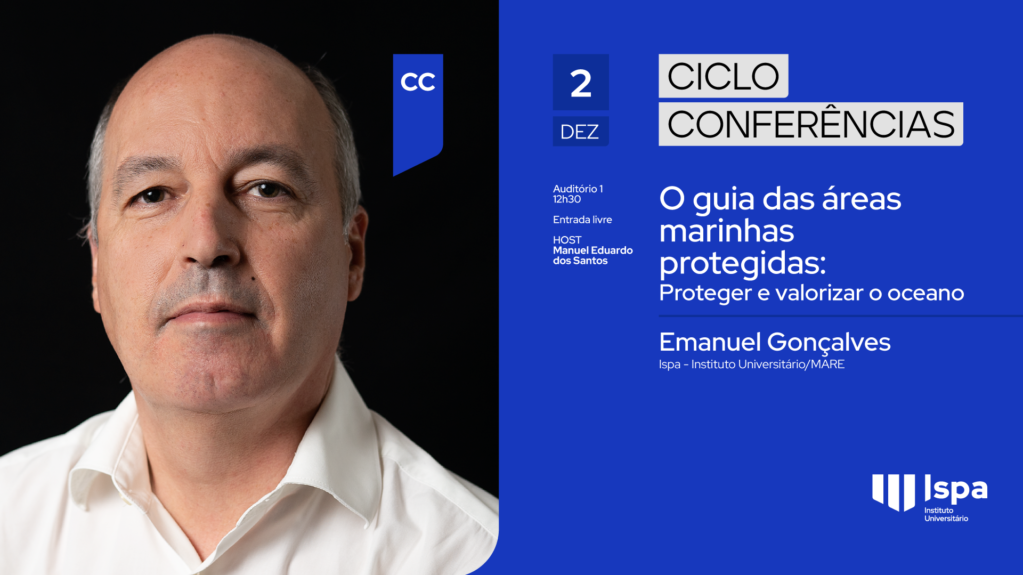
Abstract: A ciência sustenta hoje, com factos e de forma muito clara, que enfrentamos uma emergência climática e uma crise de extinção de espécies. Há décadas que os cientistas propõem soluções para proteger o oceano. Com níveis de proteção elevados e meios para a sua gestão, as áreas marinhas protegidas protegem espécies, recuperam as pescarias e reduzem os impactos das atividades humanas. Há mais de 30 anos que existem compromissos internacionais para a proteção do oceano, mas que estão muito longe de ser atingidos. O Guia de Áreas Marinhas Protegidas uniformiza a linguagem e clarifica o nível de proteção e o estado de implementação, mostrando o que podemos esperar de cada uma delas. É uma ferramenta essencial de transparência, avaliação e comunicação sobre a proteção do oceano, que permite avaliar a situação de cada país.
Using behavioral science to tackle global health challenges: what, why and how
(Universidade de Lisboa)
Abstract: The COVID-19 pandemic brought behavioural sciences to the spotlight, due to the core role of individual and societal protective behaviours. Behavioral sciences have much to contribute to tackling current global health (and planetary) challenges, by providing systematic methods of intervention development, developing classification systems to describe what is within behavioural interventions, and moving towards dynamic and adaptive approaches to behaviour change. In this talk, I will provide an overview of the most promising multidisciplinary research that is being conducted in this topic, providing practical examples of its applications to e.g. the COVID-19 pandemic, and in the context of digital technologies.
Host: Maria João Gouveia
Desenvolvimento colaborativo e validação do questionário das capacidades para os serviços comunitários de saúde mental
(Ispa – Instituto Universitário /APPsyCI)
Abstract: Será apresentada uma investigação cujo objetivo é contribuir para a avaliação e inovação dos programas comunitários de saúde mental, através de uma nova medida baseada no referencial teórico das capacidades e construída de forma colaborativa. Será também realçada: a inovação do referencial teórico das capacidades, tendo em conta o background histórico e atual do sistema de saúde mental, bem como a interligação com a psicologia comunitária; a pertinência da abordagem colaborativa na investigação e avaliação na área da saúde mental. Por fim, serão apresentadas as conclusões principais do estudo em termos de implicações para uma mudança transformativa.
Host: José Ornelas
Monstros no quarto: relações, segurança e son(h)o no desenvolvimento da criança
(WJCR, Ispa – Instituto Universitário)
Abstract: O ser humano, assim como todos os mamíferos, tem inscrita em si a necessidade de dormir. Salvo algumas exceções, que são raras, as pessoas dormem todos os dias. Ao longo dos primeiros 10 anos de vida, a criança passa mais tempo a dormir do que acordada. Porém, aproximadamente 30% das crianças apresentam alguma perturbação do sono durante a infância. Dada a importância do sono, compreender os fatores que o podem perturbar constitui-se como tarefa central para a Psicologia do Desenvolvimento. Contudo, aceder a esses fatores implica, primeiro que tudo, a capacidade de imaginar e de construir ferramentas que permitam penetrar no mundo infantil. Será que conseguiria dormir, se tivesse monstros debaixo da cama e ninguém para os mandar embora? A qualidade do sono da criança é investigada na sua relação com a existência, primeiro real, depois internalizada, de figuras protetoras, capazes de afugentar os “monstros” reais e imaginários, que assustam crianças, adolescentes e também adultos. As relações de vinculação com as figuras primárias e as suas associações com a qualidade do sono são discutidas no contexto das suas implicações numa das tarefas mais importantes da infância e da adolescência: a exploração do meio.
Host: Manuela Veríssimo
Terapia focada nas emoções: uma breve introdução
(Universidade da Maia)
Abstract: Nesta apresentação, é feita uma breve introdução à Terapia Focada nas Emoções. Esta forma de psicoterapia experiencial, neo-humanista e construtivista, que tem apoio empírico sólido na intervenção junto de um conjunto variado de perturbações emocionais, coloca o trabalho emocional no cerne da transformação terapêutica. Baseando-se numa forte presença terapêutica, aponta para a exploração empática e profunda dos processos de sofrimento emocional, cria condições para um trabalho de mudança dos processos defensivos que perpetuam as dificuldades existentes e promove uma libertação do potencial de cada pessoa.
Host: David Neto
Parenting: it’s in the heart, brain, and hormones
(Vrije Universiteit Amsterdam, the Netherlands)
Abstract: Parenting behavior is something that we can observe. But there is a lot going on in parents “under the skin” when they respond – or do not respond – to child signals. What are the neurobiological processes underlying parenting? Are these the same for fathers and mothers? An important question is also: are neurobiological factors influencing parenting behavior or could it also be the other way around, i.e., does parental behavior affect their neurobiology? These are questions that will be addressed, based on state-of-the-art empirical studies and meta-analyses.
Host: Manuela Veríssimo

What to expect when you are not expecting it: how implicit regularities drive attentional selection
(Vrije Universiteit Amsterdam; Institute Brain and Behavior Amsterdam (iBBA)/WJCR, Ispa – Instituto Universitário)
Abstract: Extracting statistical regularities from the environment is one of the most fundamental abilities of any living organism. This type of learning is largely unconscious, unintentional, and implicit that runs “in the background”, both seeking and giving structure to the world around us, making it coherent, predictable and quickly manageable. Even though a lot is known about how statistical learning affects language acquisition, object recognition, motor learning, and decision making, only recently it became apparent that it plays a key role in attentional selection. In this talk I will present an overview of recent studies investigating how statistical learning regarding the target and the distractor determines attentional control. It is argued that selection history modulates the topographical landscape of spatial ‘priority’ maps, such that attention is biased towards locations having a high activation and biased away from locations that are suppressed.
Host: Gün Semin
Participação e envolvimento das famílias na educação – Contributos para a formação de profissionais de educação de infância
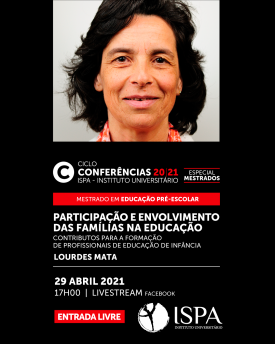
Ciclo de conferências ISPA – 2020/2021 – ESPECIAL MESTRADOS
Duração:
Início: Quinta, Abril 29, 2021 – 17:00
Fim: Quinta, Abril 29, 2021 – 18:00
Localização:
Videoconferência
No âmbito do Ciclo de conferências ISPA – 2020/2021 | ESPECIAL MESTRADOS, Lourdes Mata, dará uma palestra no contexto do Mestrado em Educação Pré-Escolar, com o título “Participação e envolvimento das famílias na educação – Contributos para a formação de profissionais de educação de infância”.
Host: Francisco Peixoto
Entrada livre
Resumo da conferência
As famílias têm um papel primordial na educação das crianças, enquanto primeiros educadores, tal como é estabelecido pela Convenção dos Direitos da Criança. Elas têm direito a conhecer, escolher e contribuir na resposta educativa dada aos seus filhos. Assim, os contextos educativos (escolas e jardins de infância) têm necessariamente de desenvolver estratégias para promover a participação plena das famílias, enquanto parceiros, e com responsabilidade partilhada. Neste sentido iremos apresentar algumas investigações desenvolvidas nos últimos anos e que nos permitiram conhecer melhor a perspetiva dos profissionais, famílias e crianças sobre o envolvimento das famílias no processo educativo. A partir das principais conclusões destas investigações, procuraremos elencar alguns elementos que consideramos essenciais estarem presentes na prática e na formação de docentes para uma abordagem intencional e consistente à participação e envolvimento das famílias.
Gone with the wind: seasonal distribution and habitat use by the reef manta ray (Mobula alfredi) in the Maldives, implications for conservation
School of Biological and Marine Sciences, Faculty of Science and Engineering, Plymouth University
Anfitrião: Peter McGregor
Saúde e os seus significados: impacto no comportamento e reações afetivas
ISPA – Instituto Universitário
Anfitriã: Cláudia Carvalho
Teoria de vinculação: referencial teórico relevante para o estudo das configurações familiares dissidentes (não-heterossexuais)
Universidad Pedagógica Nacional, Unidad Ajusco
Anfitriões: Manuela Veríssimo e Pedro Costa
Tartarugas Marinhas de São Tomé e Príncipe: Ecologia, genética e estado de conservação de diferentes populações que ocorrem neste arquipélago oceânico
Ce3c, Faculdade de Ciências da Universidade de Lisboa
Anfitriã: Rita Patrício
O estudo de aula como processo de desenvolvimento profissional de professores de Matemática
ISPA – Instituto Universitário
Anfitriã: Ana Cristina Silva
Behavioural responses of oceanic cetaceans to variation in food resources
IMAR – Institute of Marine Research; Okeanos R&D Centre, University of the Azores
Anfitrião: Paulo Catry
Projecto FOODLIT-PRO: literacia alimentar, sustentabilidade, e pandemia COVID19
ISPA – Instituto Universitário; WJCR
Anfitriã: Filipa Pimenta
Poluição por plásticos e microplásticos: desafios da complexidade
FCT/UNL; MARE-NOVA
Anfitrião: Frederico Almada
Nós e os Outros: da Integração à Participação
ISPA – Instituto Universitário
Anfitrião: Francisco Peixoto
Children as Persons of Interest: A Universal but Neglected Category in Social Perception Research
Faculdade de Psicologia, Universidade de Lisboa
Anfitriã: Teresa García-Marquez
Community psychology in the face of new total institutions: The case of migrant detention
British Academy Newton International Fellow, Centre for Criminology, University of Oxford (UK)
Anfitrião: José Ornelas
Projeto Peixes Nativos – Envolver a comunidade na conservação da Biodiversidade
ISPA – Instituto Universitário
Anfitriã: Joana Robalo
Brincar e ser ativo na infância
Professor Catedrático na Faculdade de Motricidade Humana
Anfitriã: Ana Teresa Brito
(Aprender a) Compreender a Leitura
Centro de Investigação em Educação (CIE-ISPA)
Anfitriã: Margarida A. Martins
Ilusões temporais: maleabilidade da experiência e percepção subjectiva de tempo
William James Center for Research
Anfitriã: Teresa Garcia-Marques

